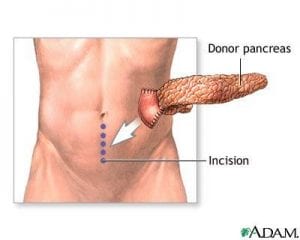 The Pancreas Transplant: If you have Type-1 diabetes, you may have heard about pancreas transplants, and you may be wondering if this could be an option for you. Perhaps it would be a good idea to examine the facts about pancreas transplants, so that you will be better informed in general as well as more prepared to discuss this subject with your physician.
The Pancreas Transplant: If you have Type-1 diabetes, you may have heard about pancreas transplants, and you may be wondering if this could be an option for you. Perhaps it would be a good idea to examine the facts about pancreas transplants, so that you will be better informed in general as well as more prepared to discuss this subject with your physician.
The main purpose of a pancreas transplant is to free the patient from his need to rely on external forms of insulin. If this procedure is recommended, and successful, you will no longer have to deal with such annoyances as frequent insulin injections. If you have been dealing with the time-consuming, uncomfortable, occasionally messy process of injecting insulin into your body for a number of years, it is quite likely that you are ready to learn about an option! After all, wouldn’t any permanent “cure” be better than coping with needles and insulin throughout the day, every day?
While this may be a tempting way of looking at the subject, the fact is that nothing is as simple as one might initially believe. One of the main drawbacks of a pancreas transplant is that your body may reject the transplanted organ. This is the case whether the transplant involves a whole pancreas or only a partial organ. Your own physician is the best person to advise you as to whether your body presents a better or lesser than average chance of accepting this new organ. It is not a decision to take lightly, because if your body rejects the transplant you can be faced with more medical complications which will need to be resolved.
In addition to this basic risk, it is also essential to determine whether or not you have pre-existing medical conditions which could make a pancreas transplant unsafe for you. With the exception of your diabetes, it is very important for you to be in good general health when undergoing this procedure. A pancreas transplant is, in itself, major surgery, so a person should be strong and healthy if he is to be considered a good candidate for a transplant.
The prospect of being relieved from external insulin dependency is a positive benefit of a pancreas transplant. If you elect to have this surgery, you may indeed find that your life and state of health is much better when you no longer have diabetes. However, it is very important for you to first consider all of the possible drawbacks before you reach a final decision. One factor which you must consider is that the transplant will require you to take medication for the rest of your life, to ensure that your body will not automatically reject the organ at a later date. These medications have the potential to cause complications, such as lowering your resistence to infection, interfering with immunizations, and possibly having side-effects.
As with any form of medical treatment, a pancreas transplant presents pro’s and con’s. When you have all of these facts in hand, you are in a better position to consider both sides of the issue and to discuss your options frankly with your physician.